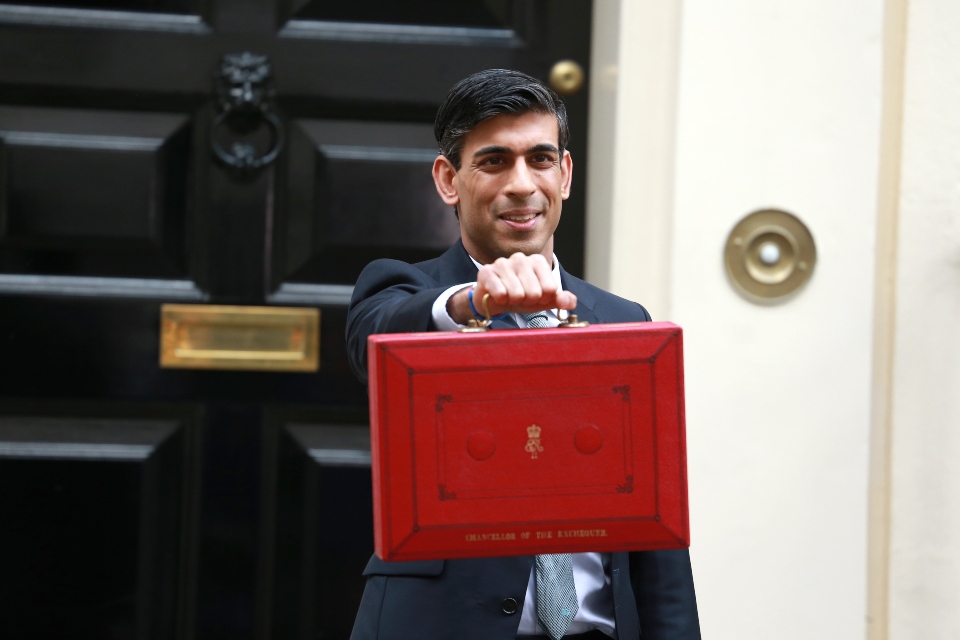Budget 2020 Overview
 Introduction
Introduction
So was it the Coronavirus Budget, or the Infrastructure Budget? Or was it, as the Chancellor declared at the end of his speech, the ‘people’s Budget from a people’s government?’ It was certainly a Budget that was high on spending commitments and one that the Chancellor declared would ‘get things done.’ Now where have we heard that before..?
Almost three months to the day after the General Election, new Chancellor Rishi Sunak delivered his first Budget speech. He delivered it, not as he might have expected, against a backdrop of optimistic economic forecasts and the opportunities of Brexit, but against the growing threat of the coronavirus outbreak, and the impact it might have on the UK economy.
The political background
On 12th December 2019, Boris Johnson won a decisive 80 seat majority for the Conservatives in the UK General Election. He promised to ‘unlock Britain’s potential’ and ‘level up opportunity’ through a huge programme of investment in the country’s infrastructure, covering road, rail and 5G connectivity.
The man charged with paying for all this and honouring the Conservative election pledge not to raise the rates of income tax, national insurance or VAT, was Chancellor (and former leadership rival) Sajid Javid. He duly announced that the first Budget of the new ‘People’s Government’ would be on Wednesday 11th March.
And then, in the cabinet reshuffle of February 2020, Javid dramatically resigned. He was swiftly replaced by his effective second in-command, Rishi Sunak, the Chief Secretary to the Treasury.
For a while there were rumours that the Budget might need to be delayed but, with Sunak impressing officials with his grasp of the details, 11th March was confirmed and, after the usual Prime Minister’s questions, the new Chancellor stood up to deliver his first Budget.
The economic background
When Sajid Javid announced the date of the Budget in early January, virtually no one had heard of coronavirus. When he resigned in mid-February, it was something largely confined to China – there were just two cases in Italy. At the time of writing, there are more than 9,000 known cases in that country, with a mortality rate of nearly 5%.
Chinese exports are down 17% in the first two months of the year as the impact of the virus is felt and, closer to home, the airline Flybe collapsed last week. It is simply impossible to say what the economic consequences of the virus will be: it could, for example, deal a significant blow to the already fragile Italian economy with a knock-on effect throughout Europe. It may do further damage to the UK high street, which saw a 7.8% drop in footfall in February.
The Federal Reserve had cut US interest rates early in the month and, on the morning of the Budget, the Bank of England followed suit, cutting the UK base rate from 0.75% to 0.25% in a bid to shore up the economy amid the virus outbreak.
So Rishi Sunak could hardly have delivered his first Budget in more difficult circumstances. Never mind coronavirus, there was also a looming oil price war: the two together had meant that Monday 9th March was the worst day on world stock markets since the economic crisis of 2008, with the UK’s FTSE100 index down by nearly 8% on the day. The US S&P 500 was down by more than 7% on the day and there were similar falls in other major world markets.
The new Chancellor faced a very difficult balancing act, described as ‘like juggling water,’ according to the BBC’s Laura Kuenssberg. He had to react to the crisis, protecting the UK economy against the worst impact of it and giving the NHS the money to cope with it, while at the same time presenting a vision of life after the coronavirus has passed.
He also needed to honour the Conservative manifesto pledge to borrow only to invest, and to limit public sector net investment to 3% of GDP. Many commentators, however, suggested that he might loosen the ‘fiscal guidelines’ to give himself some ‘wiggle room.’
Speaking ahead of the Budget statement, Sunak said, ‘This is a Budget for people right across the country – no region will be left behind.’
He added that he would ‘not let coronavirus cripple the UK economy, but we simply do not know what impact it will have.’ The usual slew of forecast growth rates in the Budget will certainly need to be taken with a very large pinch of salt. Equally, you would not rule out a second Budget in the Autumn, when the economic consequences of the virus and the steps needed for recovery can be more accurately assessed.
The speech
Opening remarks
Rishi Sunak rose to speak at 12:35 and immediately addressed the issue of coronavirus which would, he said, have a ‘significant impact’ on the UK economy. The government needed to deliver ‘stability and security’ and he wasted little time in promising that the NHS would have whatever resources it needed to tackle the threat from the virus.
However, while coronavirus was a ‘key challenge facing our country today,’ it was ‘not the only challenge,’ as he promised a Budget that would deliver ‘economic change and geographical change’ as well as ‘security today and prosperity tomorrow.’ It would be, he declared, ‘a Budget from a government that gets things done.’
The response to coronavirus
The Chancellor conceded that the virus would have a significant temporary impact on the UK economy, disrupting both the supply chain, confirming the forecast that up to 20% of people could be off work at any one time at the height of the virus, and demand in the economy, as people stayed at home. That meant he would need to deliver a ‘bridge for business’ and he confirmed that he was working closely with the Bank of England to deliver a response that was ‘temporary, timely and targeted.’
The response would come via a £30bn ‘three point plan,’ the first part of which was effectively a blank cheque for the NHS to give it the resources it needed to tackle the threat.
His second point was a ‘safety net for people,’ bringing forward the payment of statutory sick pay for all those advised to self-isolate, making it quicker and easier for the self-employed to access benefits if they were ill and removing the requirement for those receiving benefits to attend a job centre. There would also be a £500m hardship fund for local authorities to support vulnerable people in their local area.
Economic growth and the numbers
The Chancellor conceded that coronavirus would have a significant impact on the UK economy, with the Office for Budget Responsibility expecting that growth would be 1.1% in 2020, down from an earlier OBR forecast of 1.4%. However, as the economy recovers, growth should be 1.8% in 2021 (from an earlier forecast of 1.6%) followed by 1.5% in 2022 and then 1.3% in 2023 and 1.4% in 2024.
By 2025, it is expected that there will be an extra 500,000 people in work, with inflation forecast to be 1.4% this year and 1.8% next year. He said it will “remain at target” for the next three years, which presumably means the Bank of England’s target rate of 2%.
As you would expect, the Chancellor was bullish on the UK economy. There were more people in work than ever before, inflation was stable, and the economy was growing. Essentially, that was the whole point of the Budget. How are we going to pay for the significant investment in infrastructure? The economy will grow and tax revenues will go up.
Let’s hope the Chancellor is right: his Budget committed to the ‘largest sustained fiscal boost in 30 years’ as he outlined a 2.8% increase in public spending in real terms. The OBR expects a budget deficit of 2.1% of GDP in 2019/20, increasing to 2.4% in the next financial year.
Personal taxation and allowances
What: Entrepreneurs’ Relief reduced back to £1m from current £10m.
When: The measure will take effect for Entrepreneurs’ Relief qualifying disposals made on or after 11th March 2020.
Comment: Many had expected Entrepreneurs’ Relief to be fully abolished but Sunak has stopped short of this. The relief gives business owners a lower capital gains tax (CGT) rate of 10% on the sale of businesses over their lifetime. The lifetime limit, on which the 10% is eligible, reduces from £10m to £1m. The standard rate of CGT is 20%.
What: Increase in National Insurance threshold for employees and the self-employed to £9,500.
When: From April 2020.
Comment: This will save all workers earning more than £12,600 around £100 a year. Currently, employees pay 12% of their earnings in National Insurance contributions once they earn between £8,632 and £50,000 a year.
Pensions and savings
What: The Junior ISA allowance will rise from £4,368 to £9,000. The same limit will apply to Child Trust Funds (CTFs). The adult ISA allowance remains unchanged.
When: From 6th April 2020.
Comment: There is a considerable increase in the amount that can be invested in a tax efficient way for children.
Until April 2017, the adult ISA allowance increased each year, but since then it has remained unchanged at £20,000.
What: The lifetime allowance (LTA) will increase in line with CPI for 2020/21, rising to £1,073,100.
When: From 6th April 2020.
Comment: The LTA is the maximum amount an individual can accrue in a pension scheme whilst retaining the tax benefits. The LTA has been progressively whittled away since it was introduced in 2006. But in 2017, when the LTA stood at £1m, it was announced that it would from now on be increased each year in line with inflation.
What: An increase in the pensions annual allowance taper thresholds of £90,000 each. The minimum annual allowance is decreased from £10,000 to £4,000.
When: Benefits accrued on or after 6 April 2020.
Comment: The threshold income for high earners, after which their annual allowance is reduced, will be increased to £200,000. The annual allowance will only begin to taper down for individuals who also have an ‘adjusted income’ above £240,000.
Those with an adjusted income of £312,000 or more will now have a tapered annual allowance of £4,000.
Primarily, this is the government’s response to concerns from doctors and hospital consultants that they were penalised for working extra hours. The move will help reassure some doctors they can take on additional work without worrying about unexpected tax bills.
Conclusion
By the time the new Chancellor sat down, after speaking for just over an hour, he was being loudly cheered by his own side, with backbenchers leaning over the seats to congratulate him.
Most commentators were in agreement that his ‘temporary, timely and targeted’ fiscal response to the coronavirus outbreak won’t prevent UK GDP from falling sharply over the next two to three months. Together with the Bank of England’s response earlier this week, however, it greatly improves the chances that the UK economy will rebound in the second half of the year. More acerbically, Andrew Neil drily commented that Rishi Sunak had certainly ‘splashed the cash’ and that a ‘huge increase in borrowing’ was on the cards.
If people were in any doubt as to who Rishi Sunak was before the Budget, they will be in little doubt after it. As and when Boris Johnson decides to step down, then on this evidence, the Conservatives may not have to look far for his successor.
If you have any questions you would like to ask about the budget or how the coronavirus pandemic could affect your investments, please do not hesitate to get in touch. You can call us on 01789 263888 or email hello@charterswealth.co.uk.

